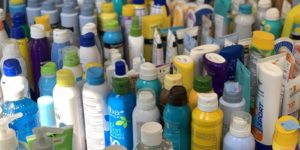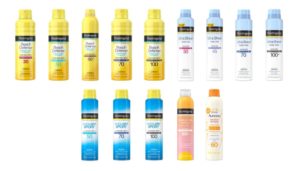BENZENE IN SUNSCREEN
AS SUMMERTIME COMES TO AN END J&J RECALLS SOME OF ITS MOST POPULAR CONSUMER PRODUCTS
On July 14, 2021, Johnson & Johnson announced it would voluntarily recall aerosol sunscreen products due to potential contamination with the chemical Benzene – a known carcinogen, or cancer-causing substance. The recall included sunscreen sprays and gels from some of Johnson & Johnson’s most popular brands, including Neutrogena and Aveeno. It came on the heels of announcements by several pharmacies that they would no longer sell the products due to possible Benzene contamination. (CVS Pulls Sun-Care Products After Carcinogen Benzene Found – Bloomberg). According to Johnson & Johnson’s website, the products included in the recall were distributed nationwide and through a wide variety of retail channels. (Johnson & Johnson Consumer Inc. Issues Voluntary Recall of Specific NEUTROGENA® and AVEENO® Aerosol Sunscreen Products Due to the Presence of Benzene | Johnson & Johnson (jnj.com)).
Related: Columbia Personal Injury Lawyers
The website notes that Johnson & Johnson is conducting an investigation into the contamination, but currently, the recall contains no information about how the products were contaminated, or the source of the Benzene. In general, Johnson & Johnson and other manufacturers of consumer products must abide by good manufacturing practices, including practices focusing on purity and quality of ingredients.
What is Benzene?
Benzene is a colorless, flammable, sweet-smelling liquid historically used in a variety of manufacturing processes, including as a starter material for plastics, lubricants, rubber, dyes, detergents, drugs, and pesticides. The use of Benzene has decreased significantly over the past several decades, due to evidence-based studies linking Benzene exposure to leukemia – particularly acute myeloid leukemia – and other cancers of the blood cells. Traditional Benzene exposure has been through the air; however, Benzene can also be absorbed through the skin, leading regulators to require special labeling on products containing in excess of 5% Benzene by weight.
These products are considered hazardous, and, in fact, for more than 40 years the Consumer Product Safety Commission has recommended a ban on products containing Benzene because of its link to Leukemia, as well as chromosomal disorders and abnormalities. Studies supporting the CPSC proposed ban found workers exhibited blood disorders even after very low levels of exposure.
At present Johnson & Johnson have set up a hotline for consumers to call with concerns, or to request a refund for the cost of the products. Consumers would do well to use caution before using these resources, however, and, should instead, contact a physician in the event of potential exposure, as well as the FDA’s adverse event reporting system.
Johnson & Johnson has yet to provide the specific lot numbers affected by the recall!
Johnson & Johnson has yet to provide the specific lot numbers affected by the recall, or to otherwise indicate how far-reaching the contamination may be, or the amount of Benzene detected. Through a spokesperson, Johnson & Johnson has provided the following statement: “ We remain committed to ensuring the products we offer are safe, work as intended, comply or regulations and satisfy customers.” (Sunscreen Recall: What to Know as J&J Recalls Some Neutrogena Sprays Over Benzene – WSJ). Despite this statement, Johnson & Johnson has not offered to provide medical monitoring, or any other form of relief for those individuals who may have been impacted by use of these products.
Recently, Johnson & Johnson, and some of its popular consumer products, have been the subject of massive litigation. For example, Johnson & Johnson subsidiary Johnson & Johnson Consumer, Inc., has faced thousands of lawsuits alleging a link between ovarian cancer and long-time staple talcum powder. Days after announcing the sunscreen recall, a Johnson & Johnson spokesperson indicated the company was considering bankrupting its subsidiary in an effort to close the chapter on these lawsuits. (Johnson & Johnson Legal Rep Floats Subsidiary Bankruptcy Filing Over Talc Lawsuits – WSJ).
Similarly, Johnson & Johnson subsidiary Ethicon, Inc. faced thousands of lawsuits alleging serious and often permanent harm related to its pelvic floor products and systems. Johnson & Johnson has also recently resolved claims against it stemming from the opioid epidemic. Of the historic $26 billion settlement announced on July 21, 2021, Johnson & Johnson will be responsible for $5 billion.
Manufacturing its COVID-19 Vaccination
In recent months, Johnson & Johnson was once again in the news arising out of issues in manufacturing its COVID-19 vaccination, where Johnson & Johnson partner Emergent Labs fell below quality standards in the manufacturing process. In fact, in April, 2021, less than three months before announcing this most recent sunscreen recall, Johnson & Johnson issued a statement that it would be increasing its oversight of drug substance manufacturing at the Emergent BioSolutions Bayview facility due to concerns that the FDA quality standards were not being met.
Meanwhile, and despite the continued manufacturing issues, sales for Johnson & Johnson increased 27% in the second quarter of 2021. In total, sales of consumer-health products (which would include the products impacted by the recall) increased 13% year over year. Days after announcing the recall, an initial consumer complaint was filed against Johnson & Johnson in the Northern District of California. Among other things, the lawsuit alleges that it was an independent third party who first brought the contaminated products to light. According to attorneys for the plaintiffs: “It should not have taken the publication of a third party’s tests to bring this critically important information to the public, and J&J’s response so far is not enough.” (J&J sued after recalling sunscreens due to cancer-causing chemical (nypost.com)).

Valisure Report
The report referred to came from Valisure, an online pharmacy. In May, 2021, the report concluded that 78 sunscreen and after-sun care products contained Benzene. The report categorized the levels of chemical as “high,” and stated: “27% of samples tested be Valisure contained detectable levels of Benzene. Some batches contained up to three times the conditionally restricted FDA concentration limit of 2 parts per million (ppm).” (Valisure Detects Benzene in Sunscreen – Valisure). The report goes on to note that “the toxicity of benzene in humas has been well established for over 120 years.” Valisure has a long history of bringing to light issues with popular consumer products, including with the drug Metformin.
By: Jessica Fickling
Contact Strom Law Firm Medical Malpractice Lawyers Today
If a medical malpractice injury has affected your life or a loved one’s, contact one of our local Medical Malpractice Lawyers today. Visit us at our Columbia office, contact us online, or give us a call at 803-252-4800 to schedule a free, confidential, no-obligation consultation with someone in our office.
Client Review
Here’s what Taneka said about Strom Law on Google:
Strom Law Firm was and still is phenomenal!!!
Fighting a disability case is a war within itself and even more so if doing it alone. I am 1000% certain that without Mario and Brian on my team my case would’ve been a loss. The high level of expertise, respect, understanding and professional service received is hard to match!
Especially, having found Mario after coming from a law firm that gave the impression that they could care less when it was time to fight! They will go the extra mile so you don’t have to!
I would recommend Mario and The Strom Law Firm team to anyone fighting a battle that they handle. The choice made, will not be one you regret!
Rating: 5/5 ⭐⭐⭐⭐⭐
Check out all of our Google reviews!



